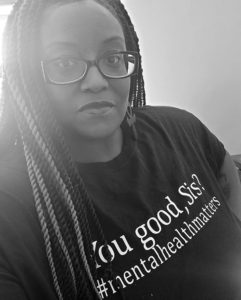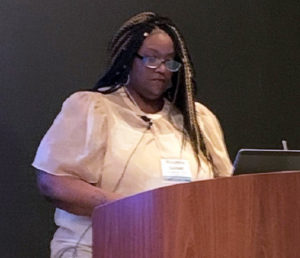‘Understanding Historical Trauma’ Workshop Helps Open the Door to Discussion and Healing

When Niquanna Barnett, in-home family therapist and intake specialist at UCC-related Orion Family Services in Madison, Wis., developed the workshop “Understanding Historical Trauma: How to Heal and Move Forward” and presented it at the CHHSM Annual Gathering in Memphis this past March, she knew it wasn’t going to be a one-time event. She had plans to expand the workshop and use it to benefit her local community.
The workshop provides education on historical trauma and the impact it has on African Americans, Native Americans, and other ethnic communities. Barnett knew that the program could benefit several local agencies and organizations, including Orion.
“I had always intended to present it to other groups because I feel that it is an extremely important topic,” Barnett says. She initially looked only at human service agencies, but then realized the program could benefit all business and service sectors. The workshop material is helpful for helping people understand, for example, “why people of color may have increased anxiety at work, or feelings of inadequacy, or the need to overachieve and take on several tasks.”
Barnett says adapting “Understanding Historical Trauma” to various groups has been easy. What started as a 75-minute presentation for CHHSM is now a three-hour workshop. She has plans to adapt it into a six-hour, all-day workshop as well.
Attendees to the workshop “gain a better understanding of how past events have shaped the culture and DNA of different ethnicities, and how it shapes and plays a role in regard to intergenerational trauma,” Barnett says.
The workshop examines the historical impact of racism, other prejudices, microaggressions, and misogyny, and how people can work together to overcome those societal ills. Barnett also sees the workshop as “a call to action for us to continue to be a diverse organization, society, and institution, and to work on combating these issues.”

The key to working together to overcome historical trauma is cultural competency, Barnett says, and an understanding of historical trauma is a significant part of that. “Understanding historical trauma and microaggressions can also help with understanding the different cycle of emotions many African Americans are experiencing in conjunction with current societal events,” she adds.
Since the Annual Gathering, Barnett has presented the workshop for an agency in Arizona, and in several Madison-area organizations, including a local university. She also presented the workshop for her Orion colleagues during a September all-staff training day. In every case, the reaction of attendees has been positive and rewarding.
“Many people have found it meaningful, and have stated that they gained a significant amount of knowledge; and that it has challenged their way of thinking and caused them to look at making changes,” Barnett says.
As a result of the workshop, one agency currently is examining its structure in order to facilitate healing and move forward. Agency employees are reading one of the books Barnett recommended and using it to help make changes.
Barnett says attendees find different portions of the workshop most meaningful. One attendee cited a workshop discussion on how certain practices during slavery have continued today as eye-opening. Another found that fully understanding microaggressions was helpful in looking at the overall context for historical trauma.
“Given everything going on in society, it is important to have an understanding of historical trauma, and how it ties into what’s happening. I believe that you need to have that foundation to have an understanding of how to move forward,” Barnett says.
“Almost every time I present, I get a bit emotional — especially during this time — because I just really want to see change,” she adds. “This is more important than you could ever know.”
If you are interested in having Niquanna Barnett present the historical trauma workshop to your group or organization, please call Orion Family Services at 608-270-2511.
Join Our Mailing LIst
"*" indicates required fields
Follow on Facebook
Pension Boards appoints David A. Klassen as its President, CEO - United Church of Christ
www.ucc.org
The Pension Boards, an affiliated ministry of the United Church of Christ recently announced its appointment of David A. Klassen as its next President and